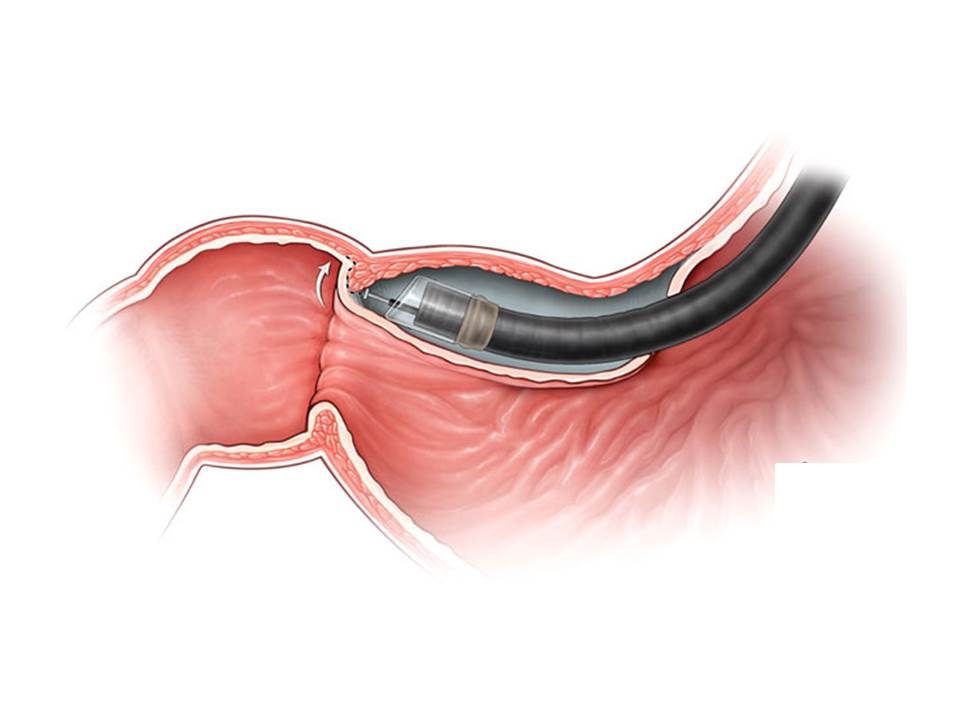Gastric Per-oral Endoscopic Myotomy (GPOEM)
What is a GPOEM?
GPOEM or G-POEM is a minimally invasive endoscopic procedure used to treat a condition called gastroparesis — when the stomach takes too long to empty its contents into the small intestine.
In G-POEM, a small cut is made in the pyloric sphincter (the valve at the bottom of the stomach), allowing food to pass through more easily and improving symptoms like bloating, nausea, vomiting, and early fullness.

Photo Reference: Malik et al. Gastrointestinal Endoscopy. Volume 101, Issue 1, January 2025, Pages 54-67.e6.
What is gastroparesis?
Gastroparesis is a condition where the stomach muscles don't work properly, slowing down or stopping the movement of food. It can be caused by:
- Diabetes
- Post-surgical nerve damage
- Medications
- Unknown reasons (idiopathic)
Common symptoms include:
- Nausea and vomiting
- Feeling full quickly when eating
- Bloating or upper abdominal discomfort
- Poor appetite and weight loss
Why is G-POEM recommended?
G-POEM is recommended when:
- Medications and dietary changes haven’t worked
- You have moderate to severe symptoms affecting quality of life
- Tests (such as gastric emptying studies) confirm delayed stomach emptying
It’s a less invasive option than traditional surgery and can provide long-term symptom relief.
How is the procedure performed?
- The procedure is done under general anaesthesia.
- A flexible tube (gastroscope) is passed through your mouth into the stomach.
- A tunnel is made under the stomach lining to reach the pyloric muscle.
- The muscle is cut (myotomy) to allow food to pass more easily.
- The tunnel is closed with small clips, which fall off on their own.
There are no external cuts or scars.
What are the benefits?
- Minimally invasive
- Improves stomach emptying
- Reduces symptoms like nausea, vomiting, and bloating
- Shorter recovery compared to traditional surgery
- May reduce the need for long-term medications or feeding tubes
What are the risks?
While G-POEM is generally safe, possible risks include:
|
Risk |
Details |
|
Bleeding |
Usually minor and controlled during the procedure |
|
Perforation |
Rare, may require additional treatment or surgery |
|
Infection |
Antibiotics are given to reduce this risk |
|
Reflux or indigestion |
May occur after the procedure |
|
No symptom improvement |
In some cases, symptoms may persist or return |
What happens after the procedure?
- Most patients stay in hospital for 1–2 days.
- You’ll start on clear fluids, then move to a soft diet, and eventually return to normal food over 1–2 weeks.
- You’ll be monitored for complications and to ensure your stomach is emptying better.
Long-term care and follow-up
- You’ll have regular follow-up with your doctor.
- Some patients may need repeat testing or further treatment.
- You may still need dietary advice or medications depending on your symptoms.
Frequently Asked Questions
Q: Will G-POEM cure gastroparesis?
A: It does not cure the underlying condition but can greatly improve symptoms in many patients.
Q: Is the procedure painful?
A: No, it is done under general anaesthesia. Mild bloating or discomfort may be felt afterwards.
Q: How successful is G-POEM?
A: Studies show up to 60% symptom improvement.
Q: Can I eat normally afterward?
A: You’ll follow a special diet for a few weeks, gradually returning to normal eating.